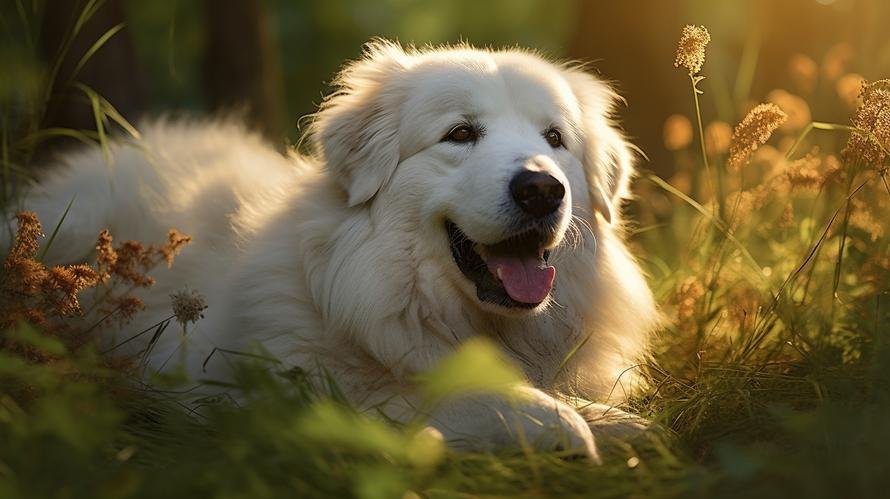Did you know that the Great Pyrenees, or Pyrenean Mountain Dog as it’s known outside of the U.S., is an ancient breed that’s been protecting livestock on the mountain slopes of France and Spain for thousands of years? That’s right, these regal and beautiful dogs are no new kids on the block. They’ve been around for centuries, tracing their roots back to Central Asia and possibly even Siberia.
You’re probably wondering, with all that history of guarding, are these dogs aggressive? The answer, as it turns out, is yes and no. But before we delve into that, let’s take a closer look at these majestic canine companions and understand what makes them tick.
The Great Pyrenees is not your average breed. This is a dog that can weigh up to 160 pounds and stand 31 inches high at the shoulder. They are gentle giants, known for their calm demeanor and affectionate nature. However, their stunning white coat and docile appearance belied a resilient and fearless heart – one honed over centuries of defending sheep from wolves and bears in the Pyrenees mountains.
Let’s address the burning question: Is the Great Pyrenees aggressive? If you’re expecting a simple answer, I’m afraid to tell you that it’s more complex than that. These dogs can indeed be aggressive, but only under certain conditions and for specific reasons.
Firstly, the Great Pyrenees was bred to be a livestock guardian. This means they are naturally protective and can be aggressive to anything or anyone perceived as a threat to their charges. This could be a potential predator, a stranger, or even an unfamiliar dog. Therefore, if a Great Pyrenees gets aggressive, they’re usually trying to protect someone or something.
However, this breed is generally very gentle and laid back. They’re known to be patient with children and tolerant of other household pets, making them excellent family dogs. They are calm and serene, often appearing aloof or independent. But don’t let this fool you. These gentle giants are fiercely loyal and have deep bonds with their human families.
To manage a Great Pyrenees’ protective instincts and prevent it from becoming problematic aggression, it is essential to socialize and train your dog from a young age. Introducing your Pyrenees to a variety of people, environments, and animals can help them understand what is and isn’t a threat. Proper training can ensure that your Pyrenees reacts appropriately, preventing potential mishaps.
Experts recommend enrolling your Great Pyrenees puppy into a socialization class or taking them to a doggy daycare for regular interaction with other dogs. This helps them learn how to behave around other dogs and also drains their abundant energy – a win-win!
Remember, the Great Pyrenees is intelligent and independent, which means they can be a bit stubborn when it comes to training. So, be patient with them. Utilize positive reinforcement techniques, offering treats or praises whenever they follow commands correctly. It is a good idea to avoid harsh punishments as they don’t respond well to negative training methods.
While training your Great Pyrenees, make sure to establish yourself as the leader. These dogs are accustomed to making their own decisions in the field, so letting them know that you’re in charge helps them understand that they don’t need to be on guard all the time.
In essence, yes, the Great Pyrenees can be aggressive, but this is generally limited to their protective instincts. They usually display their aggression through growling, barking, or standing tall and still, rather than outright attacks. Most of the time, you’ll find that your Great Pyrenees is a gentle and loyal companion who won’t hesitate to protect you when necessary.
The key to ensuring that the Great Pyrenees’ aggression doesn’t become problematic lies in your hands as the owner. With the right socialization, training, and a lot of love and patience, you can enjoy the company of this gentle giant while ensuring that their protective nature doesn’t overstep the boundaries.
In conclusion, calling the Great Pyrenees aggressive might scare off potential owners, but it’s worth noting that this breed’s “aggression” is often just a manifestation of their strong protective instincts. Understanding this aspect of their nature and training them accordingly is crucial for a harmonious cohabitation with these fantastic dogs. So, if you’ve got enough space in your home (and your heart!) for this noble breed, you’ll be rewarded with a loyal, loving, and vigilant companion.



